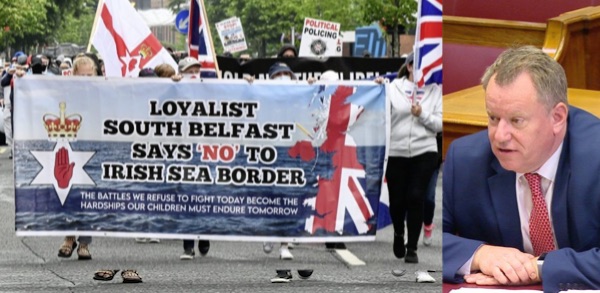
Loyalists held a protest parade in South Belfast on Thursday evening against the post-Brexit Irish Protocol. Many wore masks in a gangster style as they walked behind a traditional loyalist flute band.
Loyalists oppose the Protocol because it brings new checks on certain goods traded at ports in the north of Ireland, which they claim amounts to a new border between the two islands.
Bandsmen played tunes and beat drums and demonstrators held loyalist flags. A large banner at the front of the procession read, “Loyalist South Belfast says ‘no’ to Irish Sea border”.
Another read ‘Uphold Northern Ireland’s sovereignty, trigger Article 16 [break the agreement]’.
Other signs held by protesters had messages including “political policing must stop”, “defund the biased BBC” and [US president] “Joe Biden is an enemy of Ulster”.
The march had not been notified to the Parades Commission, and was therefore illegal, but the PSNI took no action other than issue a warning.
The rally was the largest of recent weeks and follows a relatively small turnout of loyalists at a Drumcree protest in Portadown last weekend.
Among the marchers along the Donegall Road were former unionist councillor Jolene Bunting and teenager Joel Keys.
Keys was part of a delegation which in May told a Westminster committee to expect violence over the Protocol, which he now claims has undermined his British citizenship.
Referencing World War One, he told the rally: “Our ancestors did not bleed and die on the fields of the Somme so that we could be forced to accept some kind of hybrid EU-British citizenship. Our ancestors fought for this country.”
Last week the EU announced a number of solutions to ease the implementation of the protocol, extending the grace period on chilled meats entering the Six Counties from Britain, changing its rules to allow medicines to continue to flow into the north of Ireland and waiving motor insurance rules for drivers from Britain.
But predictably, British Cabinet ministers pocketed the concessions and turned up their rhetoric further in a bid to push Brussels into conceding more.
Hyping up the possibility of loyalist violence, Brexit minister Lord Frost and British Direct Ruler Brandon Lewis warned in a letter the deal risks “damage” to the 1998 Good Friday peace Agreement unless a “new balance” is found in terms of customs checks.
Addressing that letter, Dublin’s Foreign Affairs Minister Simon Coveney said “it’s a very strange way to make friends and build a partnership” in a week when the EU had offered concessions.
He told Irish radio: “This is a week when the EU has moved, has shown generosity, has responded to requests from the British Government and from leaders in Northern Ireland.
“And at the same time, the British government shows no generosity at all, in terms of even acknowledging that there were advances this week that could build trust and relationships.”
Frost (pictured, right) fully disowned the Protocol he himself negotiated at a meeting of the Stormont Executive committee on Friday. He said it is “privileging one part of the Belfast/Good Friday Agreement over the other. There has been a shift in Northern Ireland’s place in the union.”
“You were Britain’s chief negotiator for Brexit,” he was reminded by Sinn Féin former MEP Martina Anderson.
“Your eyes were open and your fingerprints are on every page of the protocol... You weren’t asleep at the wheel. You knew that there were going to be trade adjustments - even the DUP knew there were going to be trade adjustments.”
Frost admitted he was the trade negotiator in 2019 and 2020, but said the Protocol was planned “as a balance”.
“The reason it’s not working out is because you have not honoured it,” said Anderson. “We believe that the next agreement you honour will be your first.”
She drew his attention to recent data showing “only six per cent of people polled in the north trust in the British government. Only six per cent believe the British government”.
“People do not trust you, they do not believe you, they want to see the protocol implemented in full.”
![[Irish Republican News]](https://republican-news.org/graphics/title_gifs/rn.gif)
![[Irish Republican News]](https://republican-news.org/graphics/title_gifs/harp.gif)

